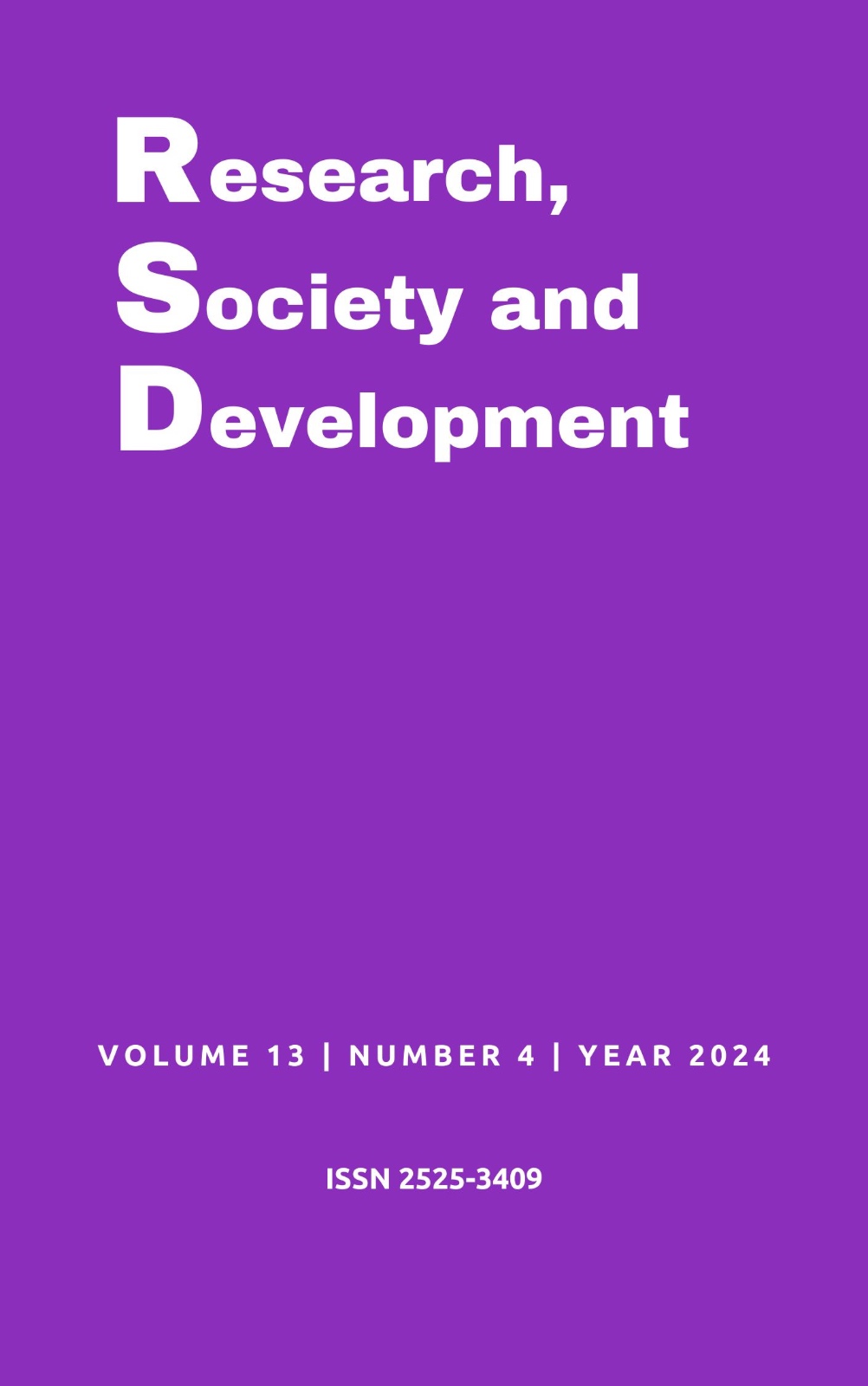Map scientific knowledge about obstetric violence and good practices in labor and birth in the literature: A scoping review protocol
DOI:
https://doi.org/10.33448/rsd-v13i4.45481Keywords:
Pregnant women, Obstetric violence, Labor obstetric.Abstract
Objective: the scoping review protocol aims to map the literature regarding scientific knowledge about obstetric violence and good practices in labor and birth, in the national and international context at primary and hospital levels. Methodology: the development of the protocol was guided by the guidelines of the Joanna Briggs Institute and the PRISMA Extension for Scoping Reviews (PRISMA-ScR). Five methodological steps will be carried out to prepare the scoping review, which will identify the types of evidence available on good practices in labor and birth and obstetric violence, clarify its main concepts/definitions in the literature, identify the main characteristics and related factors to themes. The search will take place in the databases: MEDLINE, Virtual Health Library (VHL), CAPES and LILACS Periodicals. Articles and guidelines published by national and international health bodies will be included. Included articles will be imported into Endnote and Rayyan software. In the first, the management of references and removal of duplicates will be processed and in the second, the selection of studies will be carried out. Final considerations: it is noteworthy that the data collected will support the construction of an educational booklet that will focus on guiding pregnant women about obstetric violence, labor and birth. The protocol was registered on Figshare to ensure transparency and visibility of the review process.
References
Almeida, J. V., Oliveira, E. M., Medeiros, A. S. & Carvalho, M. S. M. L. (2022). Perception of puerperal women in a maternal and children’s hospital about obstetric violence in the State of Roraima. Revista de Pesquisa Cuidado é Fundamental. 14, 1–6. https://doi.org/10.9789/2175-5361.rpcfo.v14.11680.
Andrade, I. S., Castro, R. C. M. B., Moreira, K. A. P., Santos, C. P. R. S. & Fernandes, A. F. C. (2019). Efeitos de tecnologia no conhecimento, atitude e prática de gestantes para o parto. Rev Rene. 20, e41341. https://dx.doi.org/10.15253/2175-6783.20192041341.
Arksey, H. & O’Malley, L. (2005). Scoping studies: Towards a Methodological Framework. International Journal of Social Research Methodology, 8(1), 19-32. https://doi.org/10.1080/1364557032000119616.
Barrera, D. C. & Moretti-Pires, R. O. (2021). Da violência obstétrica ao empoderamento de pessoas gestantes no trabalho das doulas. Revista Estudos Feministas, 29(1), e62136. https://doi.org/10.1590/1806-9584-2021v29n162136.
Fernandes, K. M. P. & Rosa, C. M. (2020). Medicalização do parto: a apropriação dos processos reprodutivos femininos como causa da violência obstétrica. Ciências Sociais Unisinos, 56(3), 254–265. https://10.4013/csu.2020.56.3.01.
Flores-Romero, L., Velázquez, B. M. V., Treviño-Siller, S. G. & Islas-Limón, J. Y. (2022). Violencia obstétrica en la atención del parto en Baja California: Percepciones del personal de enfermería. Frontera Norte, 34, e2243. https://doi.org/10.33679/rfn.v1i1.2243.
Lansky, S., Souza, K. V., Peixoto, E. R. M., Oliveira, B. J., Diniz, C. S. G., Vieira, N. F., Cunha, R. O. & Friche, A. A. L. (2019). Violência obstétrica: influência da Exposição Sentidos do Nascer na vivência das gestantes. Ciência & Saúde Coletiva, 24(8), 2811–2824. https://doi.org/10.1590/1413-81232018248.30102017.
Leite, T. H., Marques, E. S., Esteves-Pereira, A. P., Nucci, M. F., Portella, Y. & Leal, M. C. (2022). Desrespeitos e abusos, maus tratos e violência obstétrica: um desafio para a epidemiologia e a saúde pública no Brasil. Ciência & Saúde Coletiva, 27(2), 483–491. 10.1590/1413-81232022272.38592020.
Levac, D., Colquhoun, H. & O’Brien, K. K. (2010). Scoping studies: Advancing the Methodology. Implementation Science, 5 (69), 1–9. 10.1186/1748-5908-5-69.
Macedo, J., Antônio, I., Macedo, E. & Lopes, M. F. (2023). O plano de parto como mecanismo de proteção do direito à autodeterminação da mulher em contexto obstétrico em Portugal. Revista de Bioética y Derecho, (58), 223-242. https://dx.doi.org/10.1344/rbd2023.58.39814.
Munn, Z., Peters, M. D. J., Stern, C., Tufanaru, C., McArthur, A. & Aromataris, E. (2018). Systematic review or scoping review? Guidance for authors when choosing between a systematic or scoping review approach. BMC Medical Research Methodology, 18 (143). https://doi.org/10.1186/s12874-018-0611-x.
OMS. Organização Mundial de Saúde (2014). Prevenção e eliminação de abusos, desrespeito e maus-tratos durante o parto em instituições de saúde. https://iris.who.int/bitstream/handle/10665/134588/WHO_RHR_14.23_por.pdf?ua=1.
Peters, M. D. J., Aromataris, E. & Munn, Z. (2020). Capítulo 11: Scoping Reviews. JBI Manual for Evidence Synthesis. https://edisciplinas.usp.br/pluginfile.php/7315963/mod_resource/content/1/manual_capitulo_revisao_escopo_JBIMES_2021April.pdf.
Salgado, F. & Diaz, M. (2019). Violencia obstétrica y de género mediante la medicalización del cuerpo femenino Revista Latinoamericana de Estudios sobre Cuerpos, Emociones y Sociedad (RELACES), 11(29), 23-34. https://dialnet.unirioja.es/servlet/articulo?codigo=6984034.
Sena, L. M. & Tesser, C. D. (2017). Violência obstétrica no Brasil e o ciberativismo de mulheres mães: relato de duas experiências. Interface - Comunicação, Saúde, Educação, 21(60), 209-220. 10.1590/1807-57622015.0896.
Tricco, A. C., Lillie, E., Zarin, W., O’Brien, K. K., Colquhoun, H., Levac, D., Moher, D., Peters, M. D. J., Horsley, T., Weeks, L., Hempel, S., Akl, E. A., Chang, C., McGowan, J., Stewart, L., Hartling, L., Aldcroft, A., Wilson, M. G., Garritty, C. & Lewin, S. (2018). PRISMA Extension for Scoping Reviews (PRISMA-ScR): Checklist and Explanation. Analls of Internal Medicine, 169(7), 467-473. 10.7326/M18-0850.
Downloads
Published
Issue
Section
License
Copyright (c) 2024 Lincon Ruan da Silva; Tamara da Silva Almeida; Roberta Lima Gonçalves

This work is licensed under a Creative Commons Attribution 4.0 International License.
Authors who publish with this journal agree to the following terms:
1) Authors retain copyright and grant the journal right of first publication with the work simultaneously licensed under a Creative Commons Attribution License that allows others to share the work with an acknowledgement of the work's authorship and initial publication in this journal.
2) Authors are able to enter into separate, additional contractual arrangements for the non-exclusive distribution of the journal's published version of the work (e.g., post it to an institutional repository or publish it in a book), with an acknowledgement of its initial publication in this journal.
3) Authors are permitted and encouraged to post their work online (e.g., in institutional repositories or on their website) prior to and during the submission process, as it can lead to productive exchanges, as well as earlier and greater citation of published work.


